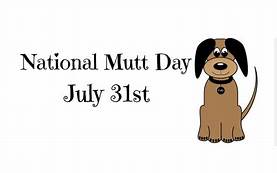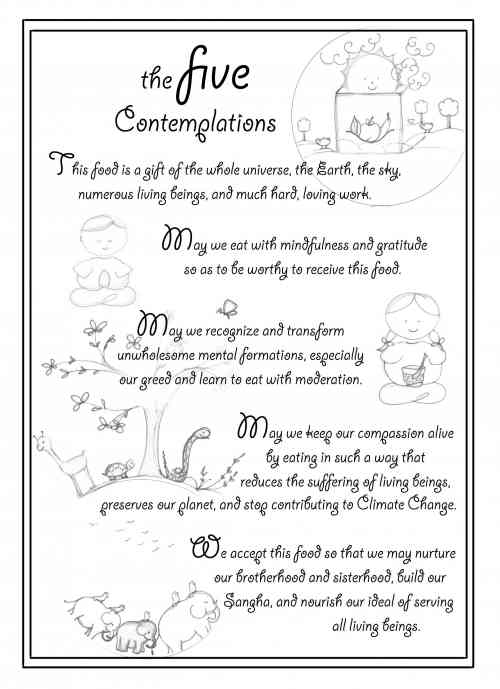Tuesday Open Thread: FORKS OVER KNIVES edition

Plum Village, a monastic community in France, founded by Zen master Thich Nhat Hanh, invites a contemplative, mindful approach to eating together. It’s not only about the individual experience (though being fully present to body and food is important!). It’s also about widening our awareness of the earth and its inhabitants.

We realize that many elements, such as the rain, sunshine, earth, air and love, have all come together to form this wonderful meal. In fact, through this food we see that the entire universe is supporting our existence.
We are aware of the whole sangha [community] as we serve ourselves and we should take an amount of food that is good for us. Before eating, . . . we can enjoy breathing in and out while practicing the five contemplations.
We should take our time as we eat, chewing each mouthful at least 30 times, until the food becomes liquefied. This aids the digestive process. Let us enjoy every morsel of our food and the presence of the dharma brothers and sisters around us. Let us establish ourselves in the present moment, eating in such a way that solidity, joy and peace be possible during the time of eating.
Eating in silence, the food becomes real with our mindfulness and we are fully aware of its nourishment. . . . After twenty minutes of silent eating, . . . we may then start a mindful conversation with our friend or begin to get up from the table.
Upon finishing our meal, we take a few moments to notice that we have finished, our bowl is now empty and our hunger is satisfied. Gratitude fills us as we realize how fortunate we are to have had this nourishing food to eat, supporting us on the path of love and understanding.
What has happened to us? Despite the most advanced medical technology in the world, we are sicker than ever by nearly every measure. Two out of every three of us are overweight. Cases of diabetes are exploding, especially amongst our younger population. About half of us are taking at least one prescription drug.
Major medical operations have become routine, helping to drive health care costs to astronomical levels. Heart disease, cancer and stroke are the country’s three leading causes of death, even though billions are spent each year to “battle” these very conditions. Millions suffer from a host of other degenerative diseases. Could it be there’s a single solution to all of these problems? A solution so comprehensive but so straightforward, that it’s mind-boggling that more of us haven’t taken it seriously?
FORKS OVER KNIVES examines the profound claim that most, if not all, of the degenerative diseases that afflict us can be controlled, or even reversed, by rejecting animal-based and processed foods. The major storyline in the film traces the personal journeys of a pair of pioneering researchers, Dr. T. Colin Campbell and Dr. Caldwell Esselstyn.

Chicago Race Riot of 1919
The Chicago race riot of 1919 was a major racial conflict that began in Chicago, Illinois, on July 27, 1919, and ended on August 3. During the riot, thirty-eight people died (23 black and 15 white) and over five hundred were injured. It is considered the worst of the approximately 25 riots during the Red Summer, so named because of the violence and fatalities across the nation. The combination of prolonged arson, looting, and murder made it the worst race riot in the history of Illinois.
The sociopolitical atmosphere of Chicago was one of ethnic tension caused by competition among many new groups. With the Great Migration, thousands of African Americans from the South had settled next to neighborhoods of European immigrants on Chicago's South Side, near jobs in the stockyards and meatpacking plants. The Irish had been established first, and fiercely defended their territory and political power against all newcomers. Post World War I tensions caused frictions between the races, especially in the competitive labor and housing markets. Overcrowding and increased African American militancy by veterans contributed to the visible racial frictions. Also, a combination of ethnic gangs and police neglect strained the racial relationships. According to official reports, the turmoil came to a boil after the death of an African-American youth who had accidentally drifted into a swimming area at an informally segregated beach. Tensions between groups arose in a melee that blew up into days of unrest.
William Hale Thompson was the Mayor of Chicago during the riot and a game of brinksmanship with Illinois Governor Frank Lowden may have exacerbated the riot since Thompson refused to ask Lowden to send in the National Guard for four days, despite Lowden ensuring that the guardsmen were in Chicago and ready to intervene.[9] Although future mayor Richard J. Daley never officially acknowledged being part of the violence, at age 17 he was an active member of the Irish Hamburg Athletic Club, which a post-riot investigation named as instigators in attacks on black Americans. In the following decades, Daley continued to rise in politics to become the city's mayor for twenty-one years.

United States President Woodrow Wilson and the United States Congress attempted to promote legislation and organizations to decrease racial discord in America. Illinois Governor Frank Lowden took several actions at Thompson's request to quell the riot and promote greater harmony in its aftermath. Sections of the Chicago economy were shut down for several days during and after the riots, since plants were closed to avoid interaction among bickering groups. Mayor Thompson drew on his association with this riot to influence later political elections.



Comments
Medieval Monks also used to have a strict no talking rule
when it came to meal times. They even evolved an entire sign language to speak during meal times. (From what I understand, they were usually read to from the bible or another rather dull book)
Speaking of dull books. New Logos. Been doing this for almost a month straight and really enjoying the hell out of it.
New Logos. Been doing this for almost a month straight and really enjoying the hell out of it.
Thanks for the OT, and hope everybody's day goes well. I'm looking forward to Judo tonight, which always improves my mood.
[video:https://www.youtube.com/watch?v=p8HstnjmaS4]
I do not pretend I know what I do not know.
healthy food healthy people
1. Removing the BAD FATS – Replacing them with GOOD FATS.
Bad fats such as hydrogenated and partially hydrogenated oils, trans fats, soybean oil, canola oil and vegetable oils cause heart disease, stroke, diabetes, cancer, chronic fatigue, and neurotoxic syndrome. Bad fats create chronic inflammation throughout the body inducing disease. Good fats are essential to hormone production, cancer prevention, brain development, weight loss, cellular healing, and anti-inflammation.
2. Change the MEATS that you EAT. (or eat no meat - my addition)
There are hundreds of studies that link commercial meats with cancer and heart disease. The grain fed to animals that were created to eat grass changes fatty acid ratios (too much omega-6, not enough omega-3) and denatures good fats, leading to modern day disease. The bioaccumulation of commercial pesticides, herbicides, antibiotics, and hormones in meats are causing a toxic onslaught, which leads to many cancers, neurological disorders and chronic illness. Grass fed and free range meats offer many fatty acids missing in the Standard American Diet (SAD) such as: aracodonic acid, congegated linoleic acid, and Omega 3 fatty acids.
3. Remove ALL Refined SUGARS and GRAINS from your Diet.
This includes white rice, white pasta, and white bread. 1/3 sugar comes from soft drinks, 2/3 from hidden sources including: lunch meats, pizza, sauces, breads, soups, crackers, fruit drinks, canned foods, yogurt, ketchup, mayonnaise, etc. High glycemic or refined sugars cause elevated glucose, which elevates insulin leading to premature aging and degenerative diseases such as type II diabetes, heart disease (inflammation of the arteries), and cancer.
Sugar is an anti-nutrient offering insignificant amounts of vitamins and minerals and robbing your body of precious nutrient stores. This inevitably leads to diseases of the new millennium such as chronic fatigue, ADD, ADHD, heart disease, diabetes, and cancers.
Low glycemic carbohydrates in the forms of fruits and vegetables have high amounts of fiber, enzymes, vitamins, minerals, and antioxidants that help you age slower, improve energy levels, lose weight, and naturally detoxify your cells.
https://draxe.com/healing-diet/
https://www.healwithfood.org/
#3 was difficult for me (I also eliminated white potatoes), but like anything you can develop new habits. Seeing your food as medicine helps you make better decisions about what (and how) to eat in order to make the best decisions for your own wellbeing.
https://www.takingcharge.csh.umn.edu/food-medicine
We are fortunate to have a garden and local producers who raise organic pastured animals. Some areas are healthy food deserts. The Japanese suggest hunger is health. Intermittent fasting is a great technique to losing body fat and improving health. There are many approaches. Here's a simple one - https://jamesclear.com/the-beginners-guide-to-intermittent-fasting I prefer 3 to 5 day water only fasts once or twice a month depending on how I feel. I'm back to my high school weight, and my mind is clearer (and memory better) than it has been in several years. I take no prescription drugs, and my blood pressure is excellent.
Good food is more expensive...but cheaper than doctors and medicine. Fasting is free...that's why few doctors educate their patients about this healthful technique. I learned from Dr Jason Fung...based on OPOL's recomendation
https://www.dietdoctor.com/intermittent-fasting
Thanks for the OT and thoughts of healthy eating.
“Until justice rolls down like water and righteousness like a mighty stream.”
Good morning, Lookout. Hope you're having a good day.
I'm not sure how to parse number 3. Is it
3. Remove ALL Refined SUGARS and GRAINS from your Diet. or
3. Remove ALL Refined SUGARS and GRAINS from your Diet.
Specifically, as to grains, and even as to unrefined whole-grain white grains, such a some specific varieties of wheat, quinoa and even rice. I do a lot of grains and nonetheless just dropped 30 pounds and feel much more active, alert and all that. I think it isn't so much the what (beyond sugar) as whether or not it is processed and how it is prepared.
That, in its essence, is fascism--ownership of government by an individual, by a group, or by any other controlling private power. -- Franklin D. Roosevelt --
ALL REFINED SUGARS!
Full stop. Get rid of them! Sugar is Everywhere, in Everything it seems.
Shop the perimeter of the supermarket, stay out of the center aisles when doing so and you eliminate up to 3/4 of said sugar. Raw honey, most fruits, and a wide variety of veggies have More than enough natural sugars to satisfy the sugar junkie(of which I am one). We just need to be aware of, and wean ourselves Off this addiction.
Ain't easy, but it Can be done.
If you do nothing else to change your eating habits, this one could save your life.
And No, I'm not perfect in this regard either. I Do try, though.
Ya got to be a Spirit, cain't be no Ghost. . .
Explain Bldg #7. . . still waiting. . .
If you’ve ever wondered whether you would have complied in 1930’s Germany,
Now you know. . .
sign at protest march
Thought I'd toss in what The Perfect Health Diet
calls out as good fats: pure butter, or ghee; olive oil; coconut oil; lard; grass fed any kind of meat fat as long as not fattened in a feed lot.
Grains which contain gluten especially wheat, oats, rye, cereal grains are off the table. Interestingly, some of the Italian old wheat is tolerated much better, on the theory it hasn't been hyper hybridized and our systems have or can adapt to it. After about two weeks on this diet, craving simply disappeared.
Debate on whether rice and/or potatoes are allowed. Also legumes like Chickpeas, as whole national groups live on these veggies. It may be the ethnic longevity in a place that matters. Rice for East Asians is a long tolerated food; the Mid East and Mediterranean area has a long history with Chickpeas.
We like this diet because there is no calorie counting, no portion control, and we have lost weight, found a steady healthy weight and stayed there with no effort except to stay on the diet. We notice during the holidays we eat more wheat-based food, and get bloat, not as much energy and take about a month afterwards to gain our balance again.
We make our own kefir, which we mix with dark red and blue berries for breakfast. Use the Kefir like sour cream and a sub for buttermilk. Any fermented food/vegetable is good too.
We do eat white rice (watching sources) and white potatoes if organic. No apparent harm. Diet also allows for coffee, chocolate and wine. Yay
Our lipid panels are always spot on, and doctors are impressed. High triglycerides are common in mid to late 60s.
The authors, Jaminet, are also proponents of fasting in small doses. Same comments about it being free.
You may choose to look the other way, but you can never say again you did not know. ~ William Wiberforce
If you can donate, please! POP Money is available for bank-to-bank transfers. Email JtC to make a monthly donation.
As noted by detroitmechworks, the silent meal ritual also
existed in certain medieval monasteries and enclaves. It is ideally suited for such because in many cases those living in monastic settings have little to impart to each other and all damn day in which to do it.
For the rest, the classic nuclear family, urban or agricultural, has much to discuss and but little joint or communal time in which to do so. For them, that time is meal time, when each may share what they did all day, what they accomplished or failed to accomplish, what they learned and discovered, etc. Then, there is also all of the planning and proscribing for the morrow and the weeks to come. Thus, among the non-monastic meal time has evolved culturally as talk time, and one sitting silent becomes a puzzlement and a source of disruption. "What's with you tonight Johnny, you're so silent?", etc.
Our health problems and issues are no doubt greatly impacted by our approach to food, the amount we eat, the speed at which we do so, the haste before and after to get on with other things, and, of course, the crap we eat and the way we prepare it. Dealing with those dietary malfunctions could well do a lot to improve our overall health. However, I suspect that solving them without ritualizing mealtimes would have nearly as much beneficial impact as solving them by ritualizing mealtimes would. "Eat food, mostly plants, in moderation" still seems the best overall plan for most folks, with some caveats like "and try not to fry them, etc."
edit: typos
That, in its essence, is fascism--ownership of government by an individual, by a group, or by any other controlling private power. -- Franklin D. Roosevelt --
Good point. And I am a firm believer in reading aloud
as a communal experience. Always seems to impart knowledge better than just reading it off a page.
And I freely admit I have a nasty tendency to scarf my meals. It takes actual effort to sit back, relax and enjoy eating.
As far as the refined sugars thing goes, I do love it when I am the one doing the cooking, and occasionally I'll find a great bargain on good food at Grocery Outlet. Recently got to do Cornish Game hens for my family extremely cheap, and even with potato flakes I could still make a very nice gravy and mashed potato combo. Small salad, but the affordable selection sucks within walking distance. (New Seasons has gone the way Of Whole Paycheck.)
I do not pretend I know what I do not know.
I went full on Vegan this January
I'd been a pescatarian and then a vegetarian, for years. I thought it would be hard to give up cheese and eggs and butter, but it's really not hard at all. I avoid all processed foods, I didn't grow up eating fast food, so thanks mom and dad for not getting me hooked on that poison! Those kinds of foods are addictive and terrible for you, they're killing the population. I understand that many, many people don't have the choice to not eat fast food. I am grateful everyday.
I do have a hearty, unhealthy love of sugar, I'm by no means a perfect eater!